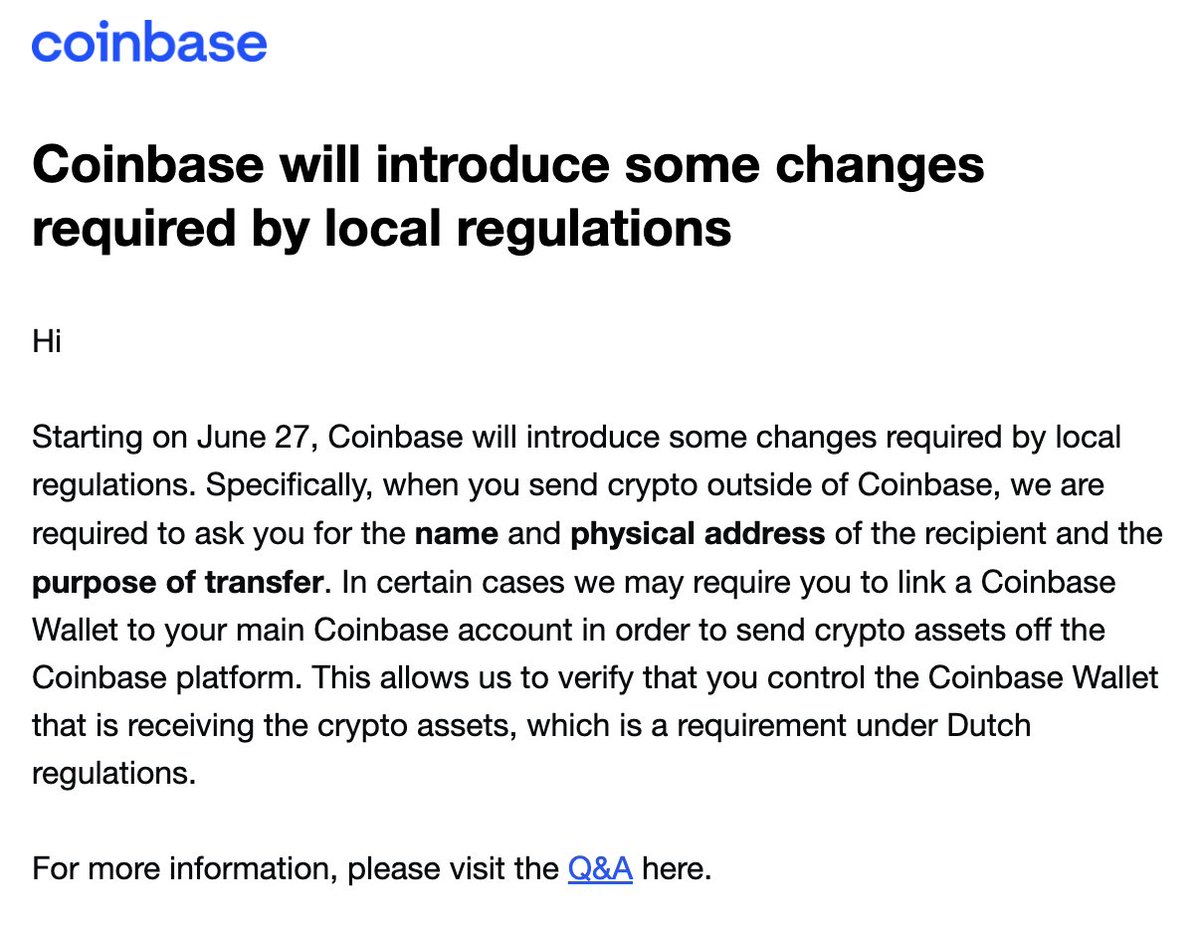Coinbase introduces tightened KYC rules for transactions. The exchange thus implements the Travel Rule. Is this a preview of a new global standard?
Some Dutch users of the globally active crypto exchange Coinbase may have rubbed their eyes in shock over the past few weeks.
From June 27th, new rules will apply to them when they transfer coins from the exchange. According to the country's regulations, Coinbase explains that you have to ask "for the name and physical address of the sender and for the purpose of the transfer".
In some cases, the exchange must also require the user to connect a Coinbase wallet to the account so that they can only send coins to this wallet. This would close the cycle, and Coinbase would always have an eye and hand on the user's cryptocurrencies, just as it is known from the banking system.
Coinbase previously introduced similar rules for Canada, Japan, and Singapore starting April 1, 2022 . For outgoing transactions, users must specify what type of wallet the recipient is using - their own or that of a service provider - and they must provide information about it, such as their name and physical address. In Canada, the rule only applies to a value of 1,000 Canadian dollars.
Coinbase is thus complying with the Travel Rule of the Financial Action Task Force (FATF). This states that financial service providers must collect and receive various information about senders and recipients. For exchange-to-exchange transactions, this can be implemented through some sort of messaging system. For this purpose, Coinbase has developed the " Travel Rule Universal Solution Technology (TRUST) " with other crypto companies. This should allow crypto service providers to meet the travel rule in a secure and minimally invasive way.
The question of how to deal with real wallets - i.e. wallets through which users manage their keys and coins independently of service providers - has long been hanging over the industry like the sword of Damocles. After the FATF expressed concern about the increasing use of such wallets, a variety of national proposals on how to deal with them have been floated, from Germany to South Korea and Japan to Estonia. The European Union is also struggling to come up with a viable answer, while the industry is discussing various solutions , not without controversy.
The Netherlands has not yet officially implemented the Travel Rule. But the Dutch National Bank, which regulates the providers, has been known for taking a particularly hard line against Bitcoin for several years. It is therefore suspected that Coinbase is proactively responding by enforcing the most stringent variant of the travel rule to date: there are no thresholds and the information that is requested goes beyond that in Japan, Singapore and Canada.
One can now fear that the Netherlands is just the beginning. The travel rule seems unavoidable, which is why crypto pioneer Jeff Garzik warns that the practice will spread to other jurisdictions as well.
The creator of the travel rule, the FATF, is pushing for it. At a meeting of members in Berlin on June 17, chaired by German lawyer Marcus Pleyer, the transnational body complained that while progress had been made in implementing the Travel Rule, it had not yet reached all countries. The slow adoption of the travel rule in many countries "opens a significant gap, leaving the sector vulnerable to abuse by criminals." Therefore, the FATF urges lawmakers to implement and enforce the travel rule expeditiously.
My Top PicksHoneygain - Passive earner that pays in BTC or PayPalMandalaExchange -The Best no KYC crypto Exchange!
BetFury - Play And Earn BFG for daily Bitcoin and ETH dividends!
Pipeflare - Faucet that pays in ZCash and Matic, Games pay in DAIWomplay - Mobile dApp gaming platform that rewards in EOS and BitcoinCointiply - The #1 Crypto Earning SiteLiteCoinPay -The #1 FaucetPay earner for LitecoinLBRY/Odysee - YouTube Alternative that lets you earn Money by viewing videos!FaucetPay - The #1 Microwallet PlatformFREEBTC - The #1 FaucetPay earner for Satoshi'sFaucetCrypto - An earning/faucet site that pays out instantlyFireFaucet - An earning site that pays better for some than Cointiply
DogeFaucet - Dogecoin Faucet
xFaucet - BTC, ETH, LTC, Doge, Dash, Tron, DGB, BCH, BNB, ZEC, FEY - Claim every 5 minutes
Konstantinova - BTC, ETH, LTC, Doge, Dash, Tron, DGB, BNB, ZEC, USDT, FEY, 25 Claims Daily


Comments
Post a Comment